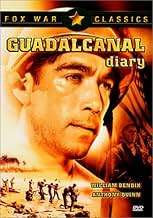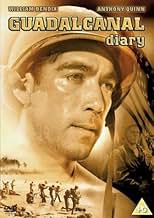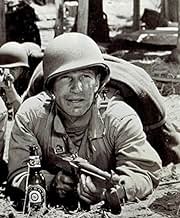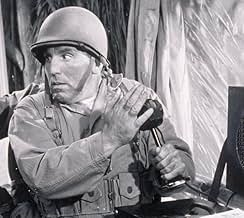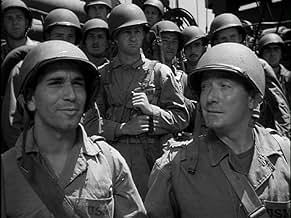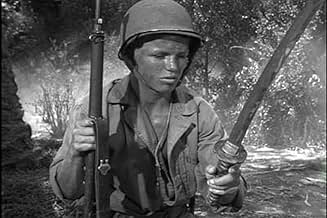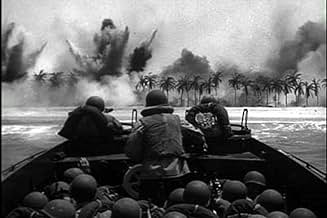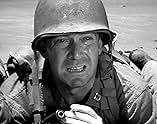VALUTAZIONE IMDb
6,7/10
2369
LA TUA VALUTAZIONE
Aggiungi una trama nella tua linguaThe story of a large U.S. Marines invasion task force bound for Guadalcanal in the Solomon Islands in 1942.The story of a large U.S. Marines invasion task force bound for Guadalcanal in the Solomon Islands in 1942.The story of a large U.S. Marines invasion task force bound for Guadalcanal in the Solomon Islands in 1942.
- Regia
- Sceneggiatura
- Star
- Premi
- 1 vittoria in totale
Eddie Acuff
- Pvt. Tex Mcllvoy
- (non citato nei titoli originali)
Warren Ashe
- Col. Morton
- (non citato nei titoli originali)
Martin Black
- Marine
- (non citato nei titoli originali)
Marion Carl
- Marine Pilot
- (non citato nei titoli originali)
Harry Carter
- Dispatch Officer
- (non citato nei titoli originali)
Tom Dawson
- Captain
- (non citato nei titoli originali)
Recensioni in evidenza
Like BATAAN and WAKE ISLAND, GUADALCANAL DIARY is another of the many gripping war films that captured attention during WWII, complete with narration by Reed Hadley as the war correspondent telling the story of how U.S. Marines fought and died at Guadalcanal. At first, the marines met no resistance since the Japanese had scattered, but soon the battles became fierce and the war drama deepens.
A stalwart cast of players gives life to the many characters, some stereotypes to be sure, but vivid, nonetheless. Interesting how RICHARD JAECKEL managed to be in just about every war film ever made during the '40s and well into future decades, still keeping his fresh-faced appeal as a baby-faced Marine. PRESTON FOSTER is the leader here, filling the sort of role usually held by Brian Donlevy, and the assorted cast members include ANTHONY QUINN, LLOYD NOLAN, RICHARD CONTE, RALPH BYRD and the ever present WILLIAM BENDIX as the guy from Brooklyn.
There's plenty to admire about the gritty and realistic battles and the overall quality of the performances, and sure, it's propaganda, the kind America needed at the time to keep morale high during the war, but it's well worth watching as a reminder of the sacrifices all these men made on behalf of our freedom today.
Trivia note: Just read Christopher Mulrooney's review of this film and you have to wonder what planet he's coming from.
A stalwart cast of players gives life to the many characters, some stereotypes to be sure, but vivid, nonetheless. Interesting how RICHARD JAECKEL managed to be in just about every war film ever made during the '40s and well into future decades, still keeping his fresh-faced appeal as a baby-faced Marine. PRESTON FOSTER is the leader here, filling the sort of role usually held by Brian Donlevy, and the assorted cast members include ANTHONY QUINN, LLOYD NOLAN, RICHARD CONTE, RALPH BYRD and the ever present WILLIAM BENDIX as the guy from Brooklyn.
There's plenty to admire about the gritty and realistic battles and the overall quality of the performances, and sure, it's propaganda, the kind America needed at the time to keep morale high during the war, but it's well worth watching as a reminder of the sacrifices all these men made on behalf of our freedom today.
Trivia note: Just read Christopher Mulrooney's review of this film and you have to wonder what planet he's coming from.
This is one of the better (and most topical) of Hollywood’s wartime efforts, but which seems to have been largely overlooked among the surplus of such films – possibly because it was helmed by journeyman director Seiler.
Still, the handling is entirely professional and the film makes the most of a good script by Lamar Trotti – peopled with believable characters ably portrayed by a fine cast (Preston Foster, Lloyd Nolan, Richard Conte, Anthony Quinn, Richard Jaeckel). The requisite comic relief provided by William Bendix and Lionel Stander is slightly overstated…but, then, Bendix delivers the film’s most moving speech towards the end.
The film – unavoidably jingoistic but, at the same time, realistic i.e. thankfully free of gung-ho heroics – balances taut action sequences (culminating in the so-called “Great Offensive”) with a handful of undeniably powerful, lingering images (particularly the line-up of dead U.S. marines ambushed on a beach by the devious Japanese forces). I’ll be following this with Cornel Wilde’s well-regarded BEACH RED (1967), which also deals with WWII combat in the Pacific; besides, I also own – but have yet to watch – the R2 DVD of Lewis Milestone’s contemporaneous THE PURPLE HEART (1944), which tackles similar events from a unique perspective.
Still, the handling is entirely professional and the film makes the most of a good script by Lamar Trotti – peopled with believable characters ably portrayed by a fine cast (Preston Foster, Lloyd Nolan, Richard Conte, Anthony Quinn, Richard Jaeckel). The requisite comic relief provided by William Bendix and Lionel Stander is slightly overstated…but, then, Bendix delivers the film’s most moving speech towards the end.
The film – unavoidably jingoistic but, at the same time, realistic i.e. thankfully free of gung-ho heroics – balances taut action sequences (culminating in the so-called “Great Offensive”) with a handful of undeniably powerful, lingering images (particularly the line-up of dead U.S. marines ambushed on a beach by the devious Japanese forces). I’ll be following this with Cornel Wilde’s well-regarded BEACH RED (1967), which also deals with WWII combat in the Pacific; besides, I also own – but have yet to watch – the R2 DVD of Lewis Milestone’s contemporaneous THE PURPLE HEART (1944), which tackles similar events from a unique perspective.
The island this film is named after is not big as islands go. Ninety miles long by roughly, twenty-odd miles wide, it lay roughly, north west by south east. The high point of Guadalcanal rose up to about 8000 feet; covered with low cloud and forest.
This film then, based on the book of the same name, and written by the war correspondent, Richard Tregaskis is, in my opinion, a better movie than, "The Sands of Iwo Jima", when it comes to paying tribute to the war record of the U.S. Marine Corps in World War Two.
I liked the opening scenes aboard the troop transport. A pleasant, and lazy Sunday morning. A religious service and hymn singing held on deck. Navy Chaplain, Father Donnelly (Preston Foster), presiding. Lloyd Nolan, as Sergeant Malone, an often under-rated actor in my opinion, wisecracking with 'Taxi' Potts, a Dodgers fanatic played by the always-likable. William Bendix. There is Richard Conte as Captain Davis. Anthony Quinn, forever a Latin-type character, Private Alvarez. Schoolboy-faced Richard Jeackel in his first-ever role, after being hoisted up from the studio mail room at Twentieth Fox. Minor Watson as Colonel Grayson, was always a reliable father-like figure who, when he landed on the beach, said this operation was unlikely to be any picnic. How right he would turn out to be. What added a shine to this film from the opening scenes was Reed Hadley narrating the story of the campaign as it unfolded, as if it was Richard Tregaskis himself. Hadley's narration seems to make the atmosphere of the film gel perfectly. A king of semi-documentary realism, if you will.
The first prisoners to be brought in are trembling, half starved in appearance, and in fear of their lives. 'Are these the monkeys were fighting?' asks Lionel Stander, as Sergeant Butch. This is the first impression they get of what passes to the marines as Japanese soldiers. It will turn out to be a false impression, soon enough. As they push further inland, the realisation soon grows that occupying this far from small, God-forsaken island is going to be no pushover. Colonel Grayson's 'no picnic' turns out to be an ugly truism.
With the Matanikau expedition a tragic failure, after landing from the sea, the realisation they're up against a determined and ferocious enemy, sinks deeper. Private Alvarez is the sole survivor from Matinikau, making it back to his own lines. Shaking with a combination of shock and vengeful anger, he recalls the other marines being picked off and bayoneted as he heads back and dives into the surf to escape.
With the second assault on Matinikau, the marine's blood is up, and they're out for blood. The Jap is taken on at his own game. The gloves are off and the chips down. They fight ruthlessness and cunning with same. And overwhelm a fanatical enemy.
In the closing scenes, the marines are relieved by fresh but yet-to-be-tried army infantrymen straight off a troop transport. One of the GI's calls out to the blooded veterans, 'What's it like?' A tired-looking Sergeant Malone answers, 'Pretty rugged, son'. For Malone, like the rest of the marines who entered the jaws of conflict and survived, they look older, and wiser. And were not found wanting. There it is then, a film that grandly commemorates the old, young men of a single platoon of the 1st Marine Division. Names on a map unknown, now entered into the history books, and the Marine Corps Hall of Fame. Matanikau, Lunga Point, Tenaru River, Bloody Ridge, Point Cruz. All fought over for a airstrip; named after Lofton Henderson, a distinguished marine pilot from the Battle of Midway.
Guadalcanal is not a name, but an emotion. So said Professor Samual Elliot Morison, the U.S. Naval Historian. How true. The Japanese were not the only enemy. There was dengue fever, malarial swamp, and humidity to sap the energy, all wrapped around with a foul-smelling jungle. There was a epitaph found at the Marine Cemetery at Lunga Point. It would have been appropriate to have displayed it along with the end credits of this film. It goes:-
That when he goes to heaven./ To Saint Peter he will tell./ Another marine reporting Sir./ I have served my time in hell.
How truthfull that piece of poetry turned out to be.
This film then, based on the book of the same name, and written by the war correspondent, Richard Tregaskis is, in my opinion, a better movie than, "The Sands of Iwo Jima", when it comes to paying tribute to the war record of the U.S. Marine Corps in World War Two.
I liked the opening scenes aboard the troop transport. A pleasant, and lazy Sunday morning. A religious service and hymn singing held on deck. Navy Chaplain, Father Donnelly (Preston Foster), presiding. Lloyd Nolan, as Sergeant Malone, an often under-rated actor in my opinion, wisecracking with 'Taxi' Potts, a Dodgers fanatic played by the always-likable. William Bendix. There is Richard Conte as Captain Davis. Anthony Quinn, forever a Latin-type character, Private Alvarez. Schoolboy-faced Richard Jeackel in his first-ever role, after being hoisted up from the studio mail room at Twentieth Fox. Minor Watson as Colonel Grayson, was always a reliable father-like figure who, when he landed on the beach, said this operation was unlikely to be any picnic. How right he would turn out to be. What added a shine to this film from the opening scenes was Reed Hadley narrating the story of the campaign as it unfolded, as if it was Richard Tregaskis himself. Hadley's narration seems to make the atmosphere of the film gel perfectly. A king of semi-documentary realism, if you will.
The first prisoners to be brought in are trembling, half starved in appearance, and in fear of their lives. 'Are these the monkeys were fighting?' asks Lionel Stander, as Sergeant Butch. This is the first impression they get of what passes to the marines as Japanese soldiers. It will turn out to be a false impression, soon enough. As they push further inland, the realisation soon grows that occupying this far from small, God-forsaken island is going to be no pushover. Colonel Grayson's 'no picnic' turns out to be an ugly truism.
With the Matanikau expedition a tragic failure, after landing from the sea, the realisation they're up against a determined and ferocious enemy, sinks deeper. Private Alvarez is the sole survivor from Matinikau, making it back to his own lines. Shaking with a combination of shock and vengeful anger, he recalls the other marines being picked off and bayoneted as he heads back and dives into the surf to escape.
With the second assault on Matinikau, the marine's blood is up, and they're out for blood. The Jap is taken on at his own game. The gloves are off and the chips down. They fight ruthlessness and cunning with same. And overwhelm a fanatical enemy.
In the closing scenes, the marines are relieved by fresh but yet-to-be-tried army infantrymen straight off a troop transport. One of the GI's calls out to the blooded veterans, 'What's it like?' A tired-looking Sergeant Malone answers, 'Pretty rugged, son'. For Malone, like the rest of the marines who entered the jaws of conflict and survived, they look older, and wiser. And were not found wanting. There it is then, a film that grandly commemorates the old, young men of a single platoon of the 1st Marine Division. Names on a map unknown, now entered into the history books, and the Marine Corps Hall of Fame. Matanikau, Lunga Point, Tenaru River, Bloody Ridge, Point Cruz. All fought over for a airstrip; named after Lofton Henderson, a distinguished marine pilot from the Battle of Midway.
Guadalcanal is not a name, but an emotion. So said Professor Samual Elliot Morison, the U.S. Naval Historian. How true. The Japanese were not the only enemy. There was dengue fever, malarial swamp, and humidity to sap the energy, all wrapped around with a foul-smelling jungle. There was a epitaph found at the Marine Cemetery at Lunga Point. It would have been appropriate to have displayed it along with the end credits of this film. It goes:-
That when he goes to heaven./ To Saint Peter he will tell./ Another marine reporting Sir./ I have served my time in hell.
How truthfull that piece of poetry turned out to be.
This is a tremendous World War II film with amazing performances. The director, Lewis Seiler, and the writer of the screenplay, Lamar Trotti, must have really been on their toes to come up with this little gem from a book by Richard Tregaskis. The quality of "Guadalcanal" is amazing from the special effects and location shots to the cinematography and the dialogue. Sometimes less is more and this movie demonstrates that in portraying the violence of war realistically without being extremely graphic. The only minor flaw I saw in the special effects was when a few soldiers were killed by grenades or bombs and they seemed to fall over from the blast a tad bit too quickly. This movie uses an ensemble cast of actors to tell the story of a platoon of U.S. marines sent to Guadalcanal to fight the Japanese in the South Pacific Ocean. The focus is not as much on the fighting and battles as it is on the men themselves in the context of war, although there are several terrific scenes of fighting and skirmishes that propel the movie along at an excellent pace. "Guadalcanal" is in glorious black and white film and is crisp and clear. Many scenes from the movie are so vivid that they have lingered in my mind long after watching the movie. I can recall vividly the palm trees on the beach, the sound of the men singing, the men lounging on the deck of the ship, Japanese soldiers being blown up in a cave and falling out of trees, the faces and expressions of the men and on and on. This movie not only stood up to a second viewing but also seemed even better the second time around. I can't praise the actors enough who breathe life into this movie and who make their characters so easy to get to know that this sixty year old movie seems like it was made yesterday. Watch this movie and see how these men respond to battle in "Guadalcanal." It's an experience not to be missed. I highly recommend it and give it a 92/100. I purchased the DVD for my collection.
I can't be offended by the truth, and the truth is, GIs called the enemy in the South Pacific "Japs," "Slant-eyes," and a lot worse. If that offends anyone, then why watch a film that you know is about a bloody WWII battle, where passions were running high? After the Marine shoots the Japanese sniper out of the tree, would it have been less offensive if he would have said, "Well, I just dispatched another one of the Asian enemy." Really! I can just imagine what someone would say in the heat of battle. It'd be a hell of a lot more descriptive than "Slant-eye."
As for the nameless reviewer who criticized the scene wherein the GI did not get mail, I can tell you first hand, that there were fewer sights more pathetic than the guys standing there after mailcall without a single letter in their hand. It was hard to watch. We all felt for those guys. You knew what they were going through, yet you couldn't do a damn thing to help them. I know how I felt when days went by without a letter from home--from ANYONE. Being in combat in a foreign land must have made it exponentially worse. I would bet that the reviewer who made that criticism never spent one day in his country's service.
As for the nameless reviewer who criticized the scene wherein the GI did not get mail, I can tell you first hand, that there were fewer sights more pathetic than the guys standing there after mailcall without a single letter in their hand. It was hard to watch. We all felt for those guys. You knew what they were going through, yet you couldn't do a damn thing to help them. I know how I felt when days went by without a letter from home--from ANYONE. Being in combat in a foreign land must have made it exponentially worse. I would bet that the reviewer who made that criticism never spent one day in his country's service.
Lo sapevi?
- QuizMarine Corps Capt. Marion Carl, a multi-ace (18.5 air victories), makes an appearance as a Marine Corps pilot. Capt. Carl wears his baseball cap with the bill pointed skyward and makes the comment, "Don't look now, fellas, but a truck of gas just came on the field." Capt. Carl was a survivor of the Battle of Midway and the air campaign for Guadalcanal in 1942. He was awarded 2 Navy Crosses for his actions at Midway and Guadalcanal. Sadly, on June 28, 1998, he was murdered in his Oregon home by a home intruder.
- BlooperWhen Japanese snipers hid in the tops of trees, they tied themselves into their positions. They did not fall out of the trees when shot.
- Citazioni
Cpl. Aloysius T. 'Taxi' Potts: [In dugout waiting out a heavy artillery barrage] I don't mind the one with my name on it. It's the one that says, 'To whom it may concern' that I don't like.
[after the barrage increases]
Cpl. Aloysius T. 'Taxi' Potts: They're throwing everything at us but the kitchen stove.
Gunnery Sgt. Hook Malone: [after an even louder explosion] That's the stove now!
- Curiosità sui creditiThe film's opening prologue in the preface of a book states: A new chapter in the history of America by a correspondent who landed on Guadalcanal with the first detachment of United States Marines.
- ConnessioniEdited into I marines delle isole Salomone (1958)
- Colonne sonoreMarine Hymn
(uncredited)
Music by Jacques Offenbach from "Geneviève de Brabant"
Played during the opening credits and occasionally in the score
I più visti
Accedi per valutare e creare un elenco di titoli salvati per ottenere consigli personalizzati
- How long is Guadalcanal Diary?Powered by Alexa
Dettagli
- Tempo di esecuzione
- 1h 33min(93 min)
- Colore
- Proporzioni
- 1.37 : 1
Contribuisci a questa pagina
Suggerisci una modifica o aggiungi i contenuti mancanti


